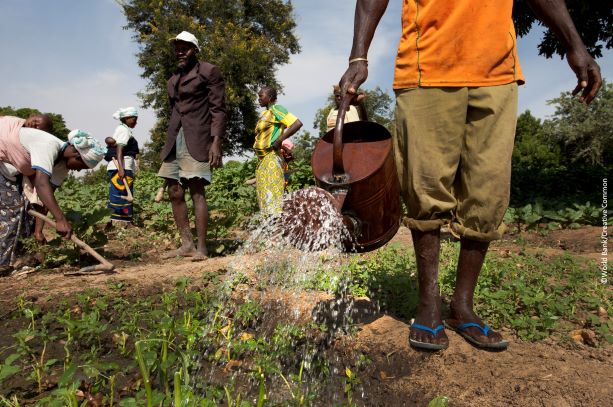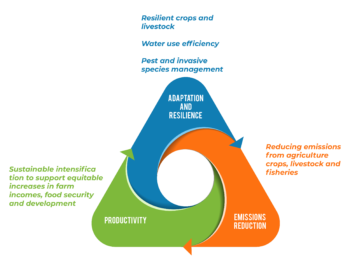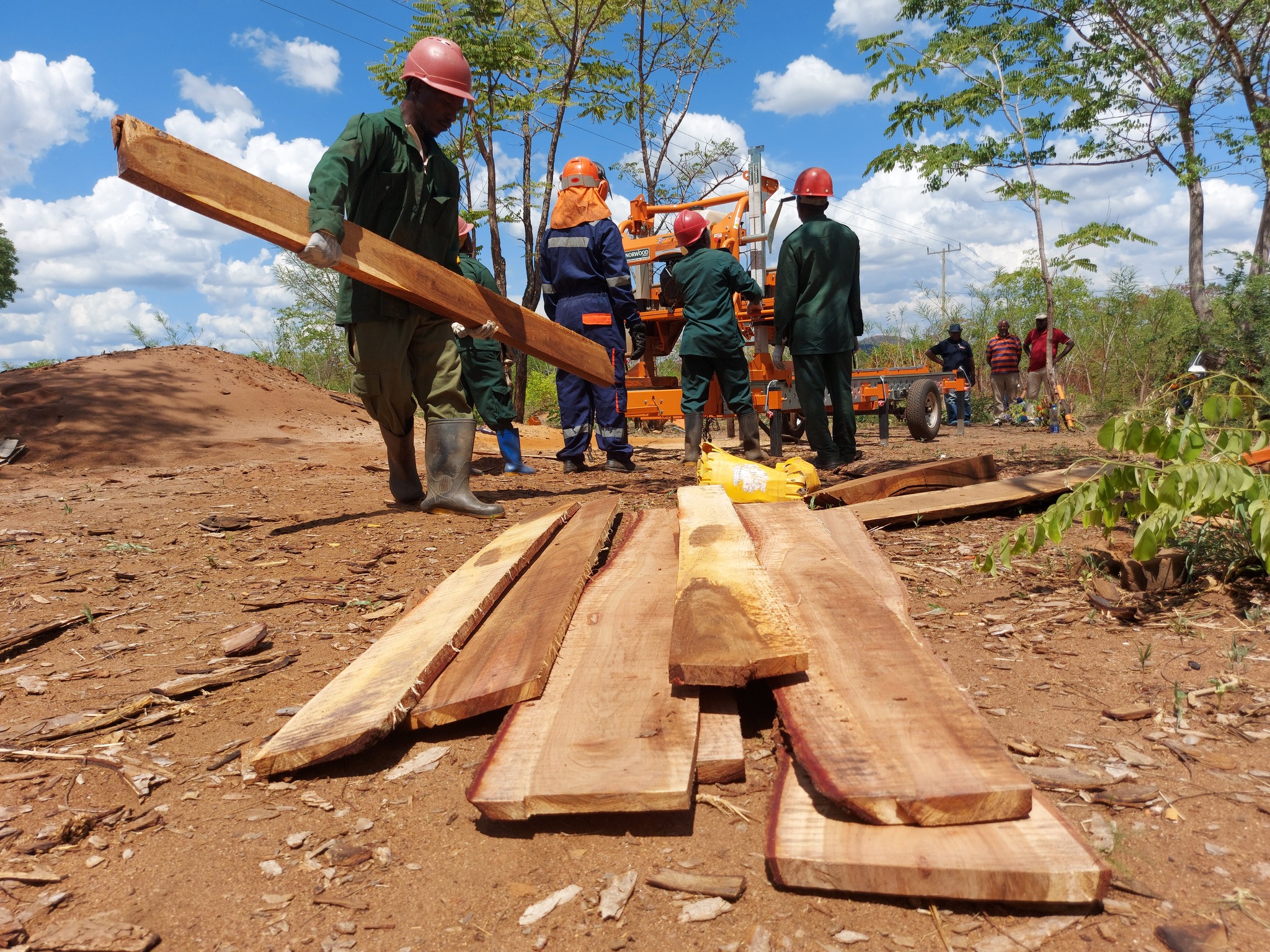
Climate-smart agriculture: Addressing rising food and nutritional insecurity
Climate change is quickly becoming one of the leading causes of severe food crises and a major risk to rural livelihoods. The number of extreme weather events has doubled since the early 1990s with an average of 213 events per year from 1990-2016. The effects of climate variations (in temperature and rainfall), and extremes (such as droughts, floods and storms), are felt most significantly in countries where a high proportion of the population depends on agriculture. In other words, developing countries will be disproportionately impacted by climate change.
Climate change is already affecting what crops can be grown where. Extreme events increase the risk of negatively impacting food production and can create sudden price increases that make nutritious food unaffordable. Millions of women and men farmers and their families face these risks today in addition to dwindling water accessibility and lower crop quality.
The 2030 Agenda for Sustainable Development (SDGs) calls for an integrated approach to strengthening resilience to climate-related disasters (Goal 13), while reducing greenhouse gas emissions in food production, and also taking into account the need to end extreme poverty (Goal 1), achieve food security (Goal 2), and make agricultural systems more sustainable.
Climate-smart agriculture (CSA)[1] is an approach that guides actions needed to transform and reorient agricultural systems to support sustainable development and ensure food security in a changing climate.
Climate-Smart Agriculture has three main objectives :
1. Sustainably increase agricultural productivity and support equitable increases in incomes
2. Adapt and build resilience to climate change at multiple levels.
3. Reduce and / or remove greenhouse gas (GHG) emissions from agriculture (including fisheries, livestock and crops).
Climate-smart-agriculture provides the means for stakeholders at local, national and international levels to identify agricultural strategies, technologies and practices suitable to their local and regional conditions. CSA is implemented at two contrasting, but complementary entry points : at the policy level (macro) and in the field where smallholder farmers and large-scale agricultural enterprises are active (micro). CSA interventions are tested “in the field” where farmers and agricultural enterprises can evaluate CSA options and build on their existing knowledge. To be truly effective, national and local institutions should support evidence-based CSA approaches through related policies, financing and investment. Using a CSA approach can take many forms. It can contribute to the introduction of new farming systems that balance short-term needs for food security with long-term resilience such as in the case of conservation agriculture. It can be a tool to assess and manage climate risks through the collection of data and evidence to understand key vulnerabilities in the agriculture sector and inform the formulation of policies to overcome them. Finally, a CSA approach can build on farmer knowledge and priorities to implement suitable climate-smart options.

Both mitigation (the reduction of GHG emissions) and adaptation (reduction of vulnerability) to climate impacts are considered through CSA. On the mitigation side, for example, livestock
is a source of an estimated 14% of all global emissions, mostly associated with the land use change change leading to higher emissions[2]. CSA practices can help reduce methane emissions from livestock through land management and the application of fertilizer that improves carbon sequestration. In terms of adaptation, CSA strategies can include practices and technologies that increase the efficiency of water and fertilizer use, increase crop diversity, and improve access to data on weather that helps farmers optimize their decision-making. Cowater has over 32 years of experience in agriculture and rural development, with a strong expertise in the water sector. We work with communities, governments and businesses to build resilience: from mitigating emissions through renewable energy projects, to implementing adaptation solutions to manage water and other natural resources. We help governments and businesses manage climate finance and implement effective policies to reduce risks. Our emphasis is on supporting the shift towards a low-carbon economy through projects that help protect natural resources, while also supporting employment and responsible growth.

We have developed our portfolio in North and West Africa, where the agriculture sector faces risks of reduced yields, shortened growing season and increased demand for irrigation. Two project examples highlight this experience.
Cowater’s Irrigation for Fruit Tree Production in Morocco project (Projet d’arboriculture fruitière en zones irriguées) was designed to generate climate-smart growth in the agricultural sector through increased productivity, and improved processing and value addition in selected fruit tree value chains (olives, almonds, figs and dates). Through improved soil and water management practices in irrigated perimeters, the fruit tree products became more competitive on national and international markets and more resilient to climate change.
By developing both technical solutions and capacity of local producers and government, the project was able to benefit directly over 136,000 households in rural areas of the North, Centre and South regions of Morocco. For CSA to work effectively, coordination and integration among various sectors working on climate change, agricultural development and food security at national, regional and local levels was key to creating an enabling policy environment. The right incentives are required, such as payments for environmental services, or investments that encourage farmers to use climate-smart practices, to overcome initial investment barriers. It was this coordinated approach which ensured the success and sustainability of our CSA project in Morocco.
Water-use efficiency is another CSA approach that can improve soil conditions and boost production, making the agricultural system more climate resilient. In Burkina Faso, Cowater’s Water and Sustainable Economic Growth in the Sahel (Eau et croissance économique durable au Sahel) project is addressing a critical need for water in this drought-prone region, a situation that greatly limits socio-economic development, especially for women. In doing so, the project is reducing the vulnerability of local populations to climate change through improved access and management of water supply. Specifically, the project is supporting climate-smart agricultural and livestock production for local producers and women’s groups.
Cowater is using a demand-driven approach where local producers’ groups and associations, heavily represented by women’s groups, took an active role in designing activities in the dairy, livestock and vegetable value chains.
These value chains were selected for their potential to improve food security, revenue generating potential, and to ensure resilience to climate shocks. For example, irrigated vegetable gardening using water conservation techniques give farmers enough water for at least two market gardening growing cycles each year, when only one cycle was possible under rainfed conditions. Over 2,500 smallholder farmers have been involved and they are increasing agricultural production levels by around 30%. Climate-smart agriculture offers unique opportunities to tackle food security, address climate adaptation and mitigation objectives, and to reduce poverty. Implementing CSA requires an appreciation of how to ensure policy at the national and sub-national level provides the right incentives to support farm-level investment. It requires holistic adaption planning and av deep understanding of the priorities that men and women farmers have as land stewards. In an era of rising food and nutrition insecurity combined with climate change, a coordinated approach that takes into account the daily realities faced by farmers is essential to in overcoming these challenges and achieving global targets set under the Sustainable Development Goals.
***
Cowater recognises the risks that climate change poses. Its expertise in designing and delivering climate-smart agriculture programs contributes to improve agricultural management and provide better livelihoods in communities while building climate resilience agricultural systems. Using a client-centric approach, we work closely with partners, governments and communities to build capacity and identify sustainable solutions that address challenges associated with rising food and nutritional insecurity in the context of a changing climate.
[1] Climate Smart Agriculture is an approach coined by the Food and Agriculture Organization of the United Nations (FAO) in 2010.
[2] Herrero, Mario, et al. “Livestock and greenhouse gas emissions: The importance of getting the numbers right.” Animal Feed Science and Technology 166 (2011): 779-782.
Related Content
Tanzanian–Finnish collaboration supporting a ‘use it or lose it’ approach in Tanzanian Community Based Forest Management
The Governments of Tanzania and Finland have worked together in partnership for decades in the forestry sector in Tanzania. Since 2018, through the Forestry and Value Chains Development Programme (FORVAC), […]
The story of two interns: one year later and over 19,000 kilometers apart
Cover photo, from left to right, Cowater International former interns turned employees: Sofia, Samantha Julien (Sam), Aude, Elizabeth McGowan (Liz) and Astrid. Elizabeth McGowan (Liz) and Samantha Julien (Sam) both […]
Cowater International to participate in 11 EU External Action 2023 Framework Contract lots
Cowater International is delighted to announce that the European Union’s Directorate General for Intenational Partnerships recently signed the contracts related to the implementation of the Framework Contract Services for EU’s […]







